
Mystery is a fiction genre where the nature of an event, usually a murder or other crime, remains mysterious until the end of the story. Often within a closed circle of suspects, each suspect is usually provided with a credible motive and a reasonable opportunity for committing the crime. The central character is often a detective, who eventually solves the mystery by logical deduction from facts presented to the reader. Some mystery books are non-fiction. Mystery fiction can be detective stories in which the emphasis is on the puzzle or suspense element and its logical solution such as a whodunit. Mystery fiction can be contrasted with hardboiled detective stories, which focus on action and gritty realism.
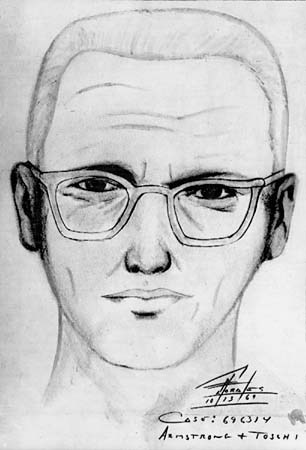
The Zodiac Killer is the pseudonym of an unidentified serial killer who operated in Northern California in the late 1960s. The Zodiac murdered five known victims in the San Francisco Bay Area between December 1968 and October 1969, operating in rural, urban and suburban settings. He targeted three young couples and a lone male cab driver. The case has been described as "arguably the most famous unsolved murder case in American history", and has become both a fixture of popular culture and a focus for efforts by amateur detectives.
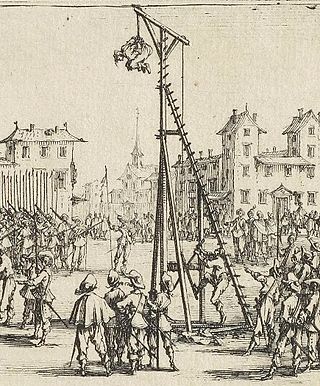
The strappado, also known as corda, is a form of torture in which the victim's hands are tied behind their back and the victim is suspended by a rope attached to the wrists, typically resulting in dislocated shoulders. Weights may be added to the body to intensify the effect and increase the pain. This kind of torture would generally not last more than an hour without rest, as it would otherwise likely result in death.

HM Prison Pentonville is an English Category B men's prison, operated by His Majesty's Prison Service. Pentonville Prison is not in Pentonville, but is located further north, on the Caledonian Road in the Barnsbury area of the London Borough of Islington, north London. In 2015 the justice secretary, Michael Gove, described Pentonville as "the most dramatic example of failure" within the prisons estate.

Crime in Canada is generally considered low overall. Under the Canadian constitution, the power to establish criminal law and rules of investigation is vested in the federal Parliament. The provinces share responsibility for law enforcement, and while the power to prosecute criminal offences is assigned to the federal government, responsibility for prosecutions is delegated to the provinces for most types of criminal offences. Laws and sentencing guidelines are uniform throughout the country, but provinces vary in their level of enforcement.
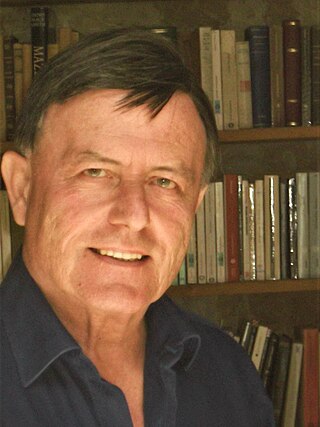
Alfred Sant, is a Maltese politician and a novelist. He led the Labour Party from 1992 to 2008 and served as Prime Minister of Malta between 1996 and 1998 and as Leader of the Opposition from 1992 to 1996 and from 1998 to 2008. Sant is an established writer and playwright and has published several books.

Homicide: A Year on the Killing Streets is a 1991 book written by Baltimore Sun reporter David Simon describing a year spent with detectives from the Baltimore Police Department Homicide Unit. The book received the 1992 Edgar Award in the Best Fact Crime category.
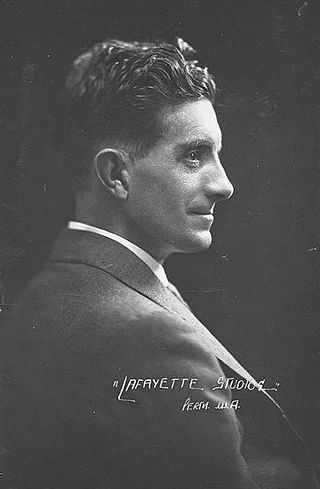
Arthur William Upfield was an English-Australian writer, best known for his works of detective fiction featuring Detective Inspector Napoleon "Bony" Bonaparte of the Queensland Police Force, a mixed-race Indigenous Australian. His books were the basis for a 1970s Australian television series entitled Boney, as well as a 1990 telemovie and a 1992 spin-off TV series.

Mary Christianna Lewis, known professionally as Christianna Brand, was a British crime writer and children's author born in British Malaya.
Paul Broussard (1964–1991), a 27-year-old Houston-area banker and Texas A&M alumnus, died after a gay bashing incident outside a Houston nightclub in the early hours of July 4, 1991. Nine teenaged youths, ages 15–17, and one 22-year-old were intoxicated on drugs and alcohol when they left a high school party in the suburb of The Woodlands and headed for Houston's heavily gay Montrose area in an attempt to gain admittance to dance clubs located in the vicinity.
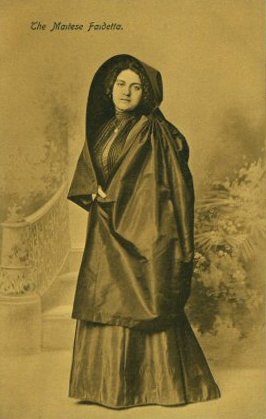
The għonnella, sometimes referred to as a Faldetta, is a form of women's head dress and shawl, or hooded cloak, unique to the Mediterranean islands of Malta and Gozo. There was an alternative blue version in the south-east of Malta, and it was referred to as xurqana. Another in the village of Għargħur was referred to as stamijna.

The Castellania, also known as the Castellania Palace, is a former courthouse and prison in Valletta, Malta that currently houses the country's health ministry. It was built by the Order of St. John between 1757 and 1760, on the site of an earlier courthouse which had been built in 1572.
Richard Orson Lockridge was an American writer of detective fiction. Richard Lockridge with his wife Frances created one of the most famous American mystery series, Mr. and Mrs. North.

The Alphabet murders are an unsolved series of child murders which occurred between 1971 and 1973 in Rochester, New York.
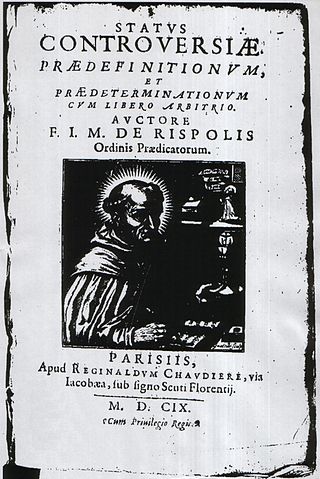
Philosophy in Malta refers to the philosophy of Maltese nationals or those of Maltese descent, whether living in Malta or abroad, whether writing in their native Maltese language or in a foreign language. Though Malta is not more than a tiny European island in the middle of the Mediterranean Sea, for the last six centuries its very small population happened to come in close contact with some of Europe's main political, academic and intellectual movements. Philosophy was among the interests fostered by its academics and intellectuals.
Kenneth Wain is a major Maltese philosopher and educator. His areas of specialisation in philosophy are chiefly education, ethics, political philosophy.

The law of Malta incorporates continental law, common law and local traditions, such as Code de Rohan. A municipal code was enacted in 1784 and replaced in 1813. Maltese law has evolved over the centuries and reflected the rule of the context of the time. At present Malta has a mixed-system codification, influenced by Roman law, French Napoleonic Code, British Common Law, European Union law, international law, and customary law established through local customs

James Warner Wallace is an American homicide detective and Christian apologist. Wallace is a Senior Fellow at the Colson Center for Christian Worldview and an Adjunct Professor of Apologetics at Talbot School of Theology in La Mirada, California. He has authored several books, including Person of Interest,Cold-Case Christianity,God's Crime Scene, and Forensic Faith, in which he applies principles of cold case homicide investigation to apologetic concerns such as the existence of God and the reliability of the Gospels. He has been featured as a cold case homicide expert on Fox 11 Los Angeles, truTV, and NBC.

The Carnival tragedy of 1823 was a human crush which occurred on 11 February 1823 at the Convent of the Minori Osservanti in Valletta, Malta. About 110 boys who had gone to the convent to receive bread on the last day of carnival celebrations were killed after falling down a flight of steps while trying to get out of the convent.














